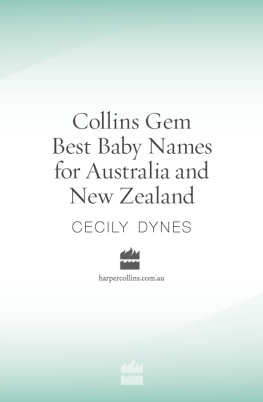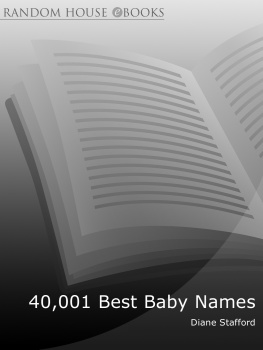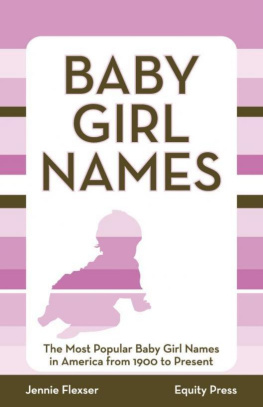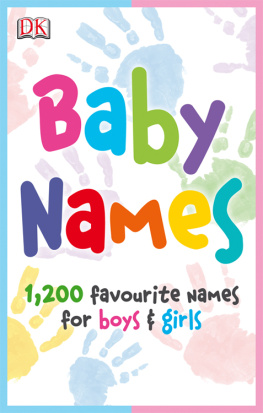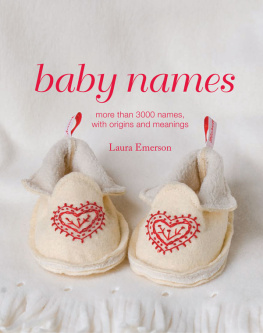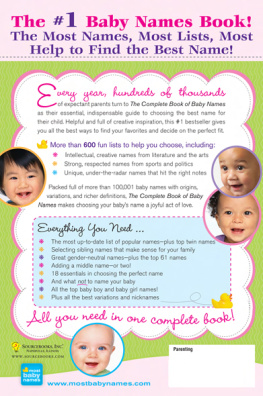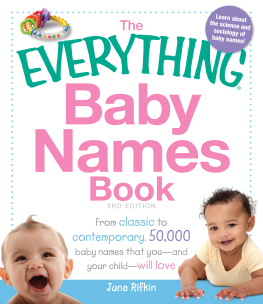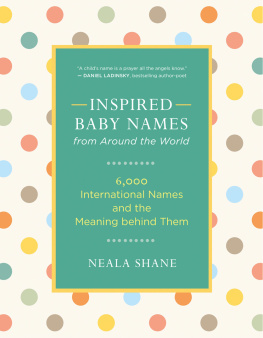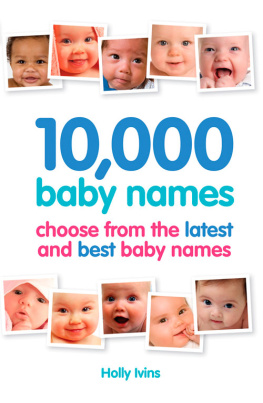During the years since my first book of baby names was written, many thousands of human beings have come to live in Australia and New Zealand. Each has brought his or her own name and naming patterns. They have come from all over the globe, from different religious and cultural backgrounds. While a few of them have adopted for themselves and their children the prevailing Anglo/Scottish/lrish names, most have continued to use the names from their country of birth. Those who will gain most from this book will be those who have the responsibility ofnaming a child or children. A name is a label, but we are increasingly learning the importance of having the right label.
The wrong name can be a handicap for a person. That is not to say that we must be ultraconservative in our naming. Human ingenuity and imagination being limitless, it is impossible to show every name. But an effort has been made to cover the most frequently found streams. There is a rich tapestry of names from which to choose. For the holder of a foreign name, I hope the book will be useful in translating the name (if required) to friends.
There may be times when someone named Yusef may want to call himself Joseph or a Ximena wants to call herself Simone. Then there are those who, for one reason or another, dislike their names. This bookmay be helpful in showing an alternative version which could make all the difference to their feeling about their name. Lastly the book is for all who are interested in names and naming in Australia and New Zealand.
Naming was a great leap forward for civilisation. Some thousands of years ago (of course we dont know just when) people could only communicate in the presence of others.
We pointed a finger and said you and me and them. After naming commenced we could say: Ugg was here. Ugg has gone. Ugg is under the big rock in the bog. Later someone probably put a mark on the rock, it became known as Uggs Rock and this led to tombstones and geography and history and civilisation generally. At first there were just first namesUgg, etceterabut as the population increased, surnames appeared in order to differentiate them.
If five Johns lived in a village they might become John the son of Thomas (Thompson), John who lived near the ford (Ford), John the Blacksmith (Smith), John from France (French) and John who was tall (Long or Lang). The surnames became hereditary in many cultures (not all, even now), but the first and later second names became given names. With the rise of the Christian church they began to be referred to as Christian names, but many names in this book are not Christian names (the Sanskrit ones, for instance) and therefore it is a book about given names. There are few Aboriginal names in this book for the Aborigines have a general disinclination to make their personal namespublic. True Aboriginal names are usually taken from sacred, mythological and totemic associations and therefore should only be spoken aloud with great reverence. According to Emeritus Professor A.P.
Elkin, one of the worlds leading anthropologists, in his book The Australian Aborigines, published by Angus & Robertson, There is also in some parts a fear lest magical use could be made of the personal name to the hurt of its owner. We do not need knowledge of such names and should not press for them. For this reason most of the Aboriginal names in this book are place and descriptive names. The same applies (to a lesser extent) to many Polynesian names, and so most of the Polynesian names in this book are historical or pakeha translations.
If you have perused this book and still cannot decide on a name, consult the Calendar Names section at the back (page 221) on or about the date the child is expected or has arrived. Dont reject the names there straight away.
Think about them for a little while. But dont try them out on too many people as nearly all names are disliked by somebody. Experiment with initials, short or long forms, how they will fit with the surname and other members of the family. Note the meaning and origin. Perhaps another form of the name would be preferable? The French or the Greek? If you consult this calendar to name a baby, do not immediately be turned off by the name on the birth date. Consider it with your other choices for a whileespecially if the child is not of the sex you expected.
You may be surprised how the name grows on you
Abbey, Abby Familiar forms of Abigail.
Abigail Hebrew father rejoiced.
Abla Arabic plump and full figured.
Abra Hebrew; feminine form of Abraham.
Achilla Feminine form of Achilles without lips.
Ada Teutonic noble.
Adama Feminine form of Adam red.
Adela Old German noble.
Adelaida Italian and Polish form of Adelaide.
Adelaide Old German noble and kind.
Adelais French form of Adelaide.
Adele French form of Adela.
Adeline A form of Adelaide.
Adena Hebrew delicate.
Adina Koori good.
Adolfine German feminine form of Adolphus noble wolf.
Adora Greek gift.
Adriana Italian feminine form of Adrian.
Adrienne French form of Adriana.
Agafia Russian form of Agatha.
Agapa, Agape Greek love.
Agatha Greek good.
Agathe French and German form of Agatha.
Agatja Greek good.
Aglaia Greek splendid beauty.
Agnes Greek pure, chaste.
Agnesca, Agnese Italian forms of Agnes.
Agneta Swedish and Swiss form of Agnes.
Agnieska Lithuanian form of Agnes.
Agnizica Polish form of Agnes.
Agostina Italian form of Augusta.
Agrafina Russian form of Agrippina.
Agrippina Latin born with feet foremost.
Aida Italian form of Ada.
Aileen Irish form of Helen.
Aine Irish joy or fire.
Aino, Aine Finnish only.
Ainsley Old English ones clearing or meadow.
Aiofe Irish; after the legendary daughter of King Dermot of Leinster.
Aisha Arabic alive.
Ajda Turkish form of Ada.
Akatautika Polynesian well poised.
Akenehi Maori form of Agnes.
Akrura Sanskrit kind.
Alameda Spanish poplar tree.
Alana, Alanna Irish Oh my child!
Alberta Feminine form of Albert noble, bright.
Albina Latin white.
Alda Teutonic old.
Aldith Old English old and battle.
Alejandra Spanish form of Alexandra.
Aleksia Danish and Norwegian form of Alexandra.
Alena Lithuanian form of Helen.
Alessandra Italian form of Alexandra.
Aleta Latin winged, bird like.
Alethea Greek truth.
Alexandra Greek defender of men.
Alexandria After the place in Egypt, named after Alexander the Great.
Alexis A form of Alexandra.
Alfonsa, Alfonsina Spanish feminine forms of Alphonso.
Alfreda Old English elf council.
Ali Diminutive of Alice.
Alice From the same root as Adelaide noble.
Alicia Latinised and Swedish form of Alice.
Alicija Polish form of Alice.
Aline, Alina Forms of Adeline.
Alinga Koori sun.
Alisa Italian form of Alice.
Alison A familiar form of Alice or a contraction of Elouise.
Allegra Latin merry and cheerful.
Alma Spanish soul.
Almira Arabic princess.
Alodie Old English wealthy.
Aloysia Teutonic famous in war.
Alphonsine Teutonic noble, ready.
Althea, Althaea Greek healing or wholesome.
Alvara Brazilian feminine form of Alvaro warrior.
Alwin, Alwyn Forms of Alvin beloved.
Alyssa Greek the flower Alyssum.

